The Opposite of Fear
2016. június 09., csütörtökRepresentatives of Reformed churches and international organisations gathered in Budapest on the first days of June to discuss the challenges presented by the refugee situation, as well as the responsibility and opportunities of churches. Having accepted the invitation of István Szabó, Ministerial President of the Reformed Church in Hungary (RCH), guests from fourteen European countries attended the meeting, which was jointly organized with the Evangelical Church in the Rhineland.
Not “if” but “how”
“The aim of our discussion is to gain a better understanding of one another with our different opinions regarding the refugee issue, and work for two days towards finding a solution to this difficult problem,” said István Szabó in his welcome speech.
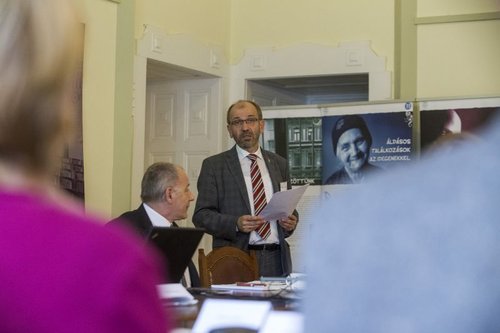
In his opening remarks, Manfred Rekowski, Praeses of the Evangelical Church in the Rhineland, pointed out that while the whole continent has been shocked by the issue, there is no sustainable solution that is acceptable to everyone, only various points of views, including national, church, organisational and individual ones. It is the duty of the church to remind everyone to consider the interests of others, not just their own. Each and every refugee must be taken in, regardless of why and from where they are fleeing, and their human rights must be fully respected. “The general consensus among the bishops, representatives of other religions, industrialists, trade unions and craftsmen I have consulted is not a question of ‘if’, but ‘how’ to develop a concrete plan for a humanitarian refugee policy, however controversial,” Rekowski said. He added that it is the duty of the church to remind people of ethical norms and of the fact that we are Christians, highlighting what guidance the Scripture provides us with in this matter as well. “All sides must work together to find a solution. We as a Reformed community have a special mission to support the state, to find a welfare solution through praying to God and valuing human life,” concluded the Praeses.
More than lip service
The participants introduced themselves through their experiences regarding the refugee issue. Some shared recent experiences: one participant helped a Gambian refugee find his lost brother, another one talked about his own family members who had recently moved abroad for economic reasons, and a third person described one of his neighbours, a former refugee who had been integrated perfectly over the past decades and is now a fully-fledged European citizen. One participant said that the Christian refugees who had arrived in his community contributed to keeping his congregation alive. Someone introduced himself as an immigrant, since there are many of us in Europe who – either because of ourselves or our parents – do not live in our country of birth any more. One speaker pointed out, bringing the example of Calvin’s life, that Reformation itself is also connected to refugees; while another claimed that being a refugee is not about one’s current residence, but rather it depends on how one wants to feel. The host of the meeting, István Szabó, brought his own example, namely that both his grandfathers, although at different times, came from outside of Hungary. He also told participants that during the Yugoslav War he and his family took in a Bosnian refugee couple for a considerable period of time, adding: “The refugee issue has to be about more than just lip service. If anyone feels they need to do something, they should open their homes to refugees.”
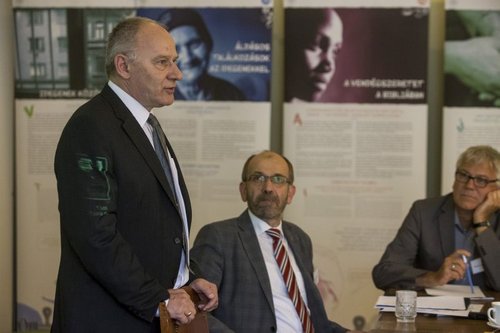
Two different attitudes towards refugees
The presentation of László Gonda, associate professor for mission and ecumenical studies at Debrecen Reformed Theological University, focused on two markedly different theological aspects of the attitude towards refugees. According to the first one, in the name of Christ we must warmly welcome those who arrive, as inclusion is at the core of our faith. This statement is supported by Biblical stories such as the calling of Abraham, Jesus fleeing to Egypt, the story of the Good Samaritan or the Parable of the Sheep and Goats. Professor Gonda cited the fact that Calvin was also a refugee in Geneva as further supporting evidence.
The second opinion is that it is our generation’s historical responsibility to protect our Christian Europe from the existential threat of mass migration. This opinion is supported by the depiction of Hungary as the place that has always been a shield protecting Europe, the Western world and Christianity. László Gonda added that the situation in the 16th century, the period from which this concept originates, was more complex than our current one. He reminded us that some of the Hungarian troops made an alliance with the Turks against Vienna, the West and Christianity, so the pastors serving in these communities must have had a hard time explaining such actions.
The associate professor quoted the statement of the General Convent of the Hungarian Reformed Churches on European migration, in which the idea of protection is supplemented by a socially sensitive and inclusive aspect. In order to show the diverse nature of different opinions, he gave the example of the statement of the Reformed Presbytery of Csongrád in 2015, which was completely dominated by a self-protective attitude.
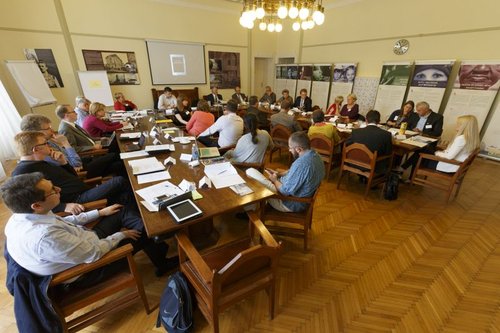
The limits of our responsibility
Apart from the above-mentioned two theological aspects (the protection of Europe versus solidarity towards those arriving and those already living here), Professor Gonda mentioned further potential dilemmas, such as the limits of the responsibility of church and state, the differences between what the state and the church can do, the conflict or combination of the ethic of ultimate end and the ethic of responsibility, politics based on a sense of guilt and on pity, as well as the mission from the margins. As a conclusion, he quoted the Scripture, Leviticus 19:18: “You shall love your neighbour as yourself,” and recommended a book by Dorottya Nagy on migration and theology.
Reacting to the presentation, participants pointed out that the command to protect our Christian Europe has no Biblical basis, and both protection and inclusion are the duties of the church as well as the state. A question arose regarding the definition of Europe as a Christian entity. One participant remarked that showing openness towards others could contribute to our own self-definition. The idea of an inclusive Europe also came up, where everyone, including the conquering Hungarian forefathers and refugees, could find a home.
The crisis of dealing with refugees
In her talk, Doris Peschke, General Secretary of the Churches’ Commission for Migrants in Europe, told participants that their ecumenical organisation, which has been operating for over five decades, is interested in both refugees and integration: not only in immigrants and asylum seekers, but also the fight against racism and discrimination. During her presentation, which was well-supported by relevant data, she emphasized that two-thirds of refugees, forty million people, live in their own country as refugees; the majority of the twenty million refugees who have left their home country currently reside in the Middle East and Africa (in Lebanon, Jordan, Turkey and Kenya, among other places); while 1.2 million asylum seekers were registered in the twenty-eight European countries in 2015. In her opinion, what we currently see in Europe is not primarily a refugee crisis, but rather a crisis in refugee management. There is no exact data on the number of refugees who have entered Europe, since many of them have been registered in more than one country, while others have not been registered at all. It is a tragic fact that out of the more than one million refugees who have come to Europe, nearly four thousand died during their journey.
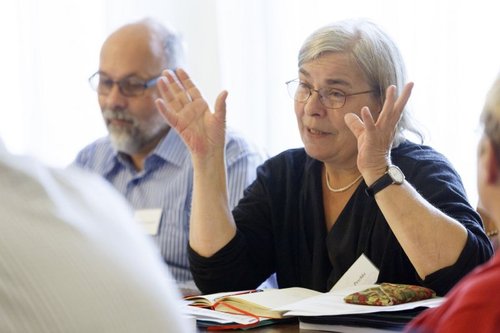
The joint European refugee system, which was set up in 2013 and implemented in 2015, came about as a result of a need for a unified refugee policy. According to Doris Peschke, it is a further complication that in several European countries, such as Greece and Italy, the refugee crisis was accompanied by an economic crisis.
Making decisions in the light of facts
The aim of the Churches’ Commission for Migrants in Europe is to make recommendations for European governments and to provide them with assistance in managing the refugee situation, while at the same time representing Christian values. During their 2014 Assembly, they drew attention to the need to change attitudes, while in 2015 they met with officials of the European Union. Peschke added that it is unfortunate that only a small fraction of the steps suggested by them have been implemented so far. In her estimation, it would be necessary to revise the policies regarding the legal entrance of economic refugees, humanitarian visas, and the visa requirements for countries in crisis in order to reduce human trafficking and increase security. Their publication called Mapping Migration, which is also available online at the organisation’s website, contributes to clarity by providing factual data, with the aim of allaying fears generated by false data and enhancing political discourse.
The General Secretary considers the crisis to be a global one, and therefore believes it is important to recognize it as global. This intention was reflected by the UN summit held in March 2016, the statements of which were also presented at the General Assembly in May. Doris Peschke also emphasized the importance of ensuring that the idea of “fear not” is more than just a Biblical quote. Their organisation strives to make that a reality. Balázs Ódor, Head of the Ecumenical Office of RCH, thanked Doris Peschke for her presentation, and reiterated that a change in attitudes is indeed only possible on the basis of actual facts and figures.
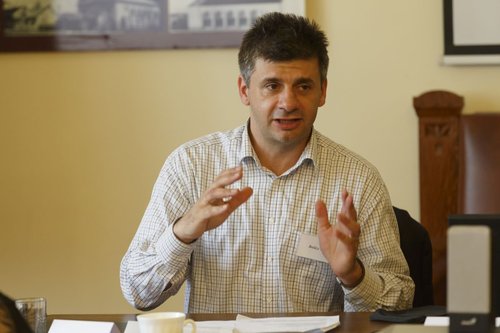
Xenophobia is a challenge
Among the case studies from each country, Dóra Kanizsai-Nagy, Head of the Refugee Mission of RCH, reported on the refugee situation in Hungary. She talked about the growing number of refugees: from 3,100 in 2008 to over 177,000 in 2015. She said that the primary aim of the mission is to enhance the integration of refugees who wish to stay here, and they have had successes in this area. She was happy to share some good news with the participants: one of their clients had just been granted Hungarian citizenship the day before the meeting. She pointed out that xenophobia, which is currently increasing, is a particular challenge that makes their work more difficult.
Inclusion interrupted
The Swedish situation was presented by Emanuel Furbacken, Coordinator for Migrant Work in Swedish Uniting Church. He said that for a long time, Sweden had been a particularly inclusive country, with an extremely high number of residents born abroad. Due to the growing number of refugees in the current crisis, today there are 190,000 refugees in Sweden, which is 2 per cent of the total population (9.5 million people). By 2016, the high figure of new refugees of the previous year had dropped drastically. Although the attitude of the general public is basically and on the whole supportive, there is a growing sense of fear and xenophobia, therefore new legislation is planned to be adopted by the Swedish Parliament in July, which would make refugee administration longer and more difficult. The protest against the proposed draft legislation is led by churches.
The aim is integration
Germany’s refugee policy was presented by Rafael Nikodemus, Church Councillor responsible for Christian- Muslim relations and Refugees. In 2015, 1.1 million refugees entered Germany, mostly from Syria, Iraq and Afghanistan. The formerly speedy refugee administration was altered in the summer, and it became stricter as a result. Public opinions show regional differences: urban residents are more tolerant, while rural attitudes are rather negative. “Inclusion is only the first step, and integration is a task of great significance,” added Nikodemus. He emphasized that, in their opinion, inclusion should take place regardless of the refugees’ ethnic and religious background. At the end of his presentation, the expert also mentioned that refugee work has invigorated church life, and their activities are supported by many volunteers, some of whom are volunteering for the first time.
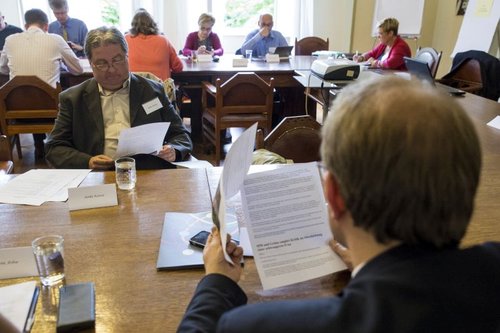
Safe Passage
Francesco Sciotta of the Waldensian Evangelical Church in Italy talked about a programme called Safe Passage, in the development of which the Waldensians took an active part. He expressed his gratitude to the Lord for the opportunity to be able to answer this calling to help those living in the periphery, those who have been marginalised – in line with the message of László Gonda. He made it clear that, in his view, the protection of refugees is first and foremost a duty of the state. Their programme initiates the formulation of humanitarian passages, in the framework of which they set up registration points in countries of origin to provide an alternative to human traffickers and their “death ships.” These registration points carry out preliminary data collection and inspection, providing safe entrance to Europe for those who have been granted a visa. The first such entrance point was established in Lebanon, where there are currently over two million Syrian refugees.
Two simultaneous crises
The special situation of Greece was described by Alexandra Nikolara, Refugee Expert of the Greek Evangelical Church. She pointed out that their country had been hit by two crises at the same time: an economic and a refugee one. As a result, the church, which had already taken steps to deal with the economic crisis, was able to react quickly to the refugee crisis as well. They carry out their work of charity and support throughout the country. She also reported on a growing sense of fear and outrage in Greece, and yet people are still definitely helpful.
The point of view of those left behind
The statistics of the refugee crisis in Ukraine were described by Dóra Kanizsai-Nagy. The number of refugees entering and leaving the country is roughly the same: most refugees have left for Hungary, Poland and Russia, but there is also a considerable domestic wave of refugees.
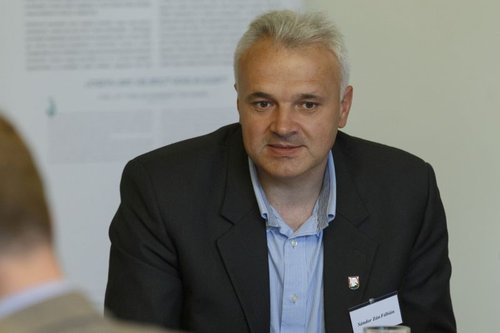
Sándor Zán Fábián, Bishop of the Reformed Church in Sub-Carpathia, Ukraine, gave a personal account of the refugee situation, in which he drew participants’ attention to new aspects of the issue. The Bishop was told by a Syrian refugee that he had left his country due to the war, economic difficulties, and the lack of safety and health care. “Any of my fellow citizens could say the same,” Sándor Zán Fábián added. Citing a recent opinion poll, he said that 55 per cent of Ukraine’s population aged 18-35 is planning to leave the country for good. The war zone has also been abandoned by many – older people have moved within the country, while younger ones have gone abroad. The patriotism of one and half years ago has turned into extreme nationalism on the one hand, and complete disillusionment on the other. As a result, there is a great deal of labour shortage; and once young people have left, it is mostly women, children and the elderly who are left behind. It is a new task of the church to take care of them. Once integrated into the host countries, refugees – the majority of who are active – become employees and taxpayers, leaving a void in their country of origin which has raised and educated them. “This is another way to look at the issue. The willingness of European countries to integrate refugees is painful for us to see, and it is difficult to accept,” he concluded.
The ideal situation versus reality
The second day of the meeting began with a worship led by Martin Engels, who read out the Parable of the Good Samaritan. Engels, Moderator of the Reformed Alliance in Germany, pointed out in his sermon that the Scripture describes what the world should be like, whereas the media shows what the world is actually like.
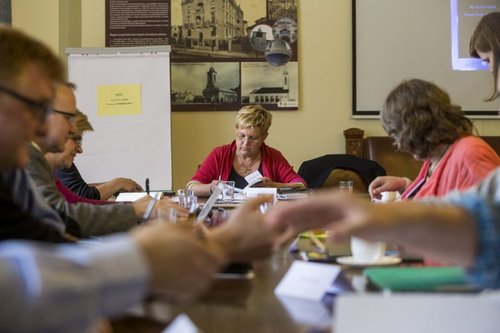
The series of presentations was continued by Balázs Ódor, European Vice-President of the World Communion of Reformed Churches (WCRC), who gave a brief talk on the Task Force on Migration they have set up recently. He explained that a major goal in establishing such a working group was to contribute to defining how we should interpret ourselves as European Christians during the refugee situation, and to encourage and strengthen us all. The working group operates on the basis of relevant theological guidelines, and its members aim to provide partner churches with programme suggestions that involve real action. They also hope to contribute to the dialogue between Christians and Muslims, including in it members of Christian communities in the Middle East, sharing best practices and strengthening solidarity.
Towards the end of the meeting, Aaron C. Stevens, Minister of the Scottish Mission in Budapest, gave a summary of what had been said during the two days. It became clear that while there are many similarities in the stories told, there is a lack of exact and unified definitions. There are some concepts that mean different things to everyone, and there are some that have become empty. Also, there are two separate narratives about the events of the refugee situation. It is problematic if we only perceive these stories from our own point of view as this way we fail to see the whole picture, and fail to realize that the other people involved are human beings, too.
In order to spark discussion, Rev Stevens created and shared word clouds created based on the different ways in which society talks about migration and refugees. A word cloud is an image composed of words used in a particular text where the size of each word indicates its frequency of use. Click here to view the word clouds used at the consultation to gain a greater understanding of the language and tone used when discussing migration and refugees.
Do not stay silent
A variety of issues were raised during the concluding debate. What is the crisis really about –people coming, or the fear of people coming? Is the crisis a European or a global one? Do the fears generated by incorrect and miscommunicated figures contribute to the crisis?
During the discussion on the idea of a Christian Europe, both Martin Engels and Manfred Rekowski agreed that this concept has been used and misused by radical politicians who hope to gain votes generated by fear. László Gonda added that we must not evade this topic, as it is a part of today’s political discourse, and we miss out on an important opportunity by staying silent. It provides us Christians with a great chance to talk about real values, while at the same time it requires the church to share with the general public what it is doing for refugees. Joshua Ralston, lecturer in Muslim-Christian Relations at the University of Edinburgh, said that besides the idea of a Christian Europe, we should not forget about the protection of the liberal values of a liberal Europe, either. Balázs Ódor added that we should also talk about the protection of our secular space, as it has been created by us, Protestant people. The refugees who arrive in Europe must understand that the place they have entered is a secular Europe.
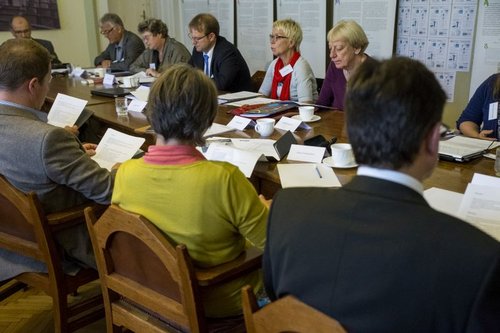
How to overcome fear?
Regarding the issue of protecting our Christian Europe, István Szabó warned that we must not forget about the relative nature of this notion, as little more than a quarter of a century ago it used to refer to Western Europe only. He emphasized that the protection of Europe’s Christian identity must not become a holy crusade; instead, it should be about preserving values of a Christian origin. Doris Peschke underlined the significance of religious “literacy” and the promotion of religious culture because in today’s Europe there are many who do not understand Christianity or religious values, including the respect of strangers.
Francesco Sciotto pointed out that, following in the footsteps of Jesus, we must keep in mind that it is not only us who experience fear because of the refugee situation, but also refugees themselves. According to István Szabó, the real question is how to overcome the fear that is present in all of us. “The opposite of fear is not courage. Fear can be overcome with the help of love, humility and responsibility,” said the Bishop.
Text by Zoltán Körösvölgyi
Translated by Erzsébet Bölcskei
Photos by András Dimény, Vargosz
Contact us
Click here if you are interested in twinning.
Reformed Church in Hungary
Address: H-1146 Budapest, Abonyi utca 21.
PO Box: 1140 Budapest 70, Pf. 5
Email: oikumene@reformatus.hu
English, German and Korean language services in Budapest
Links
Recommended articles
-
Pastoral Letter in the Light of the Pandemic
Bishop Dr. István Szabó sent a pastoral letter of encouragement to the ministers serving in RCH’s congregations, expressing his gratitude for the persistence and creativity of the pastors.
-
RCH Joins in Pope's Call for Prayer
RCH published the call on congregations to join the initiative of Pope Francis, supported by ecumenical organisations, to unite in praying the Lord’s Prayer on Wednesday, 25 March, at noon.
-
English Speaking Worship Services Online
Each Sunday at 11 AM (CET) the St. Columba's Church of Scotland in Budapest, the international community of RCH invites you to join the worpship service on its facebook page.
-
Test of Humanity and Companionship
Reformatus.hu asked Dr. György Velkey, Director General of the Bethesda Children’s Hospital of RCH about the challenges of health care workers and ways of prevention against the pandemic.
-
All Church Events Suspended
In light of the coronavirus the Presidium of RCH requested congregations to suspend all church events with immediate effect. Beside restrictions, it calls for prayer, sobriety and responsibility.











